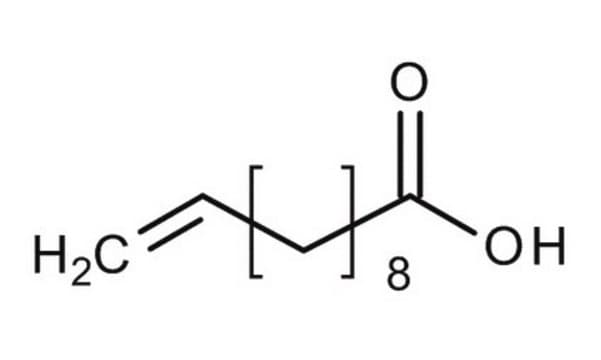W324720
Undecylenic acid
natural, ≥97%, FG
Synonyme(s) :
10-Undecenoic acid
About This Item
Produits recommandés
Qualité
FG
Fragrance grade
Halal
Kosher
natural
Niveau de qualité
Agence
follows IFRA guidelines
meets purity specifications of JECFA
Conformité réglementaire
EU Regulation 1223/2009
EU Regulation 1334/2008 & 178/2002
FDA 21 CFR 110
Pureté
≥97%
Indice de réfraction
n20/D 1.449 (lit.)
Point d'ébullition
137 °C/2 mmHg (lit.)
Pf
23-25 °C (lit.)
Densité
0.912 g/mL at 25 °C (lit.)
Application(s)
flavors and fragrances
Documentation
see Safety & Documentation for available documents
Allergène alimentaire
no known allergens
Allergène de parfum
no known allergens
Propriétés organoleptiques
woody; sweet
Chaîne SMILES
OC(=O)CCCCCCCCC=C
InChI
1S/C11H20O2/c1-2-3-4-5-6-7-8-9-10-11(12)13/h2H,1,3-10H2,(H,12,13)
Clé InChI
FRPZMMHWLSIFAZ-UHFFFAOYSA-N
Vous recherchez des produits similaires ? Visite Guide de comparaison des produits
Mention d'avertissement
Warning
Mentions de danger
Conseils de prudence
Classification des risques
Aquatic Chronic 3 - Eye Irrit. 2 - Skin Irrit. 2
Code de la classe de stockage
11 - Combustible Solids
Classe de danger pour l'eau (WGK)
WGK 1
Point d'éclair (°F)
300.2 °F - closed cup
Point d'éclair (°C)
149 °C - closed cup
Faites votre choix parmi les versions les plus récentes :
Déjà en possession de ce produit ?
Retrouvez la documentation relative aux produits que vous avez récemment achetés dans la Bibliothèque de documents.
Les clients ont également consulté
Notre équipe de scientifiques dispose d'une expérience dans tous les secteurs de la recherche, notamment en sciences de la vie, science des matériaux, synthèse chimique, chromatographie, analyse et dans de nombreux autres domaines..
Contacter notre Service technique













